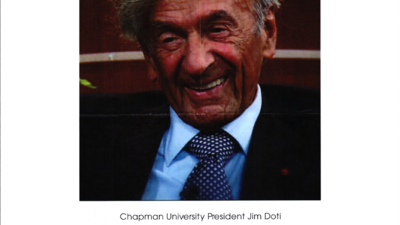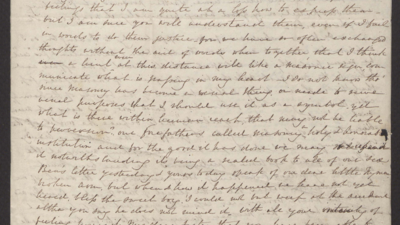Oral History Interview with Jacques Lipetz
Title
Date
Contributor
Summary
Jacques Lipetz was born in Antwerp, Belgium, 1932. He was educated at Takhemoni, a Jewish school. He relates many childhood memories. He vividly describes his family’s flight through France to Marseille in May 1940. Jacques, his mother and two brothers went to Lisbon via Spain, his father via Morocco. An interesting vignette explains how he managed to join his family.
Jacques and his family sailed to New York City in 1941 but could not stay because their quota number had not come up yet. They booked passage to the Philippines and landed in Manila in May or June 1941. He describes their life as Belgian subjects under Japanese occupation. Jacques attended a private school run by the Christian Brothers, and describes his religious education as a Sephardic Jew in a congregation dominated by Ashkenazic German Jews, as well as antisemitic persecution by Filipino students. He gives an interesting account of Japanese cultural attitudes and their treatment of foreigners and natives. The Japanese brought civilian Jewish internees to High Holiday services. He tells a charming story of how a Japanese officer helped his brother get his scooter back from a German Nazi family. Jacques describes conditions in Manila towards the end of the war and liberation by Americans. Jewish chaplains held a Passover Seder for the Jewish community at the Manila racetrack. The Lipetz family left Manila for America in late 1945 and received a permanent visa five years later.
Historical endnotes by Dr. Michael Steinlauf are in the transcript.
Interviewee: LIPETZ, Jacques Date: July 21, 1988
reserves right to publish
More Sources Like This
of
Eva Bentley
Eva Bentley, nee Wahrmann, was born in Budapest to a Jewish family with a 500-year history in Hungary. She mentions some of their significant contributions to religious and political life. Details of antisemitic incidents with a teacher and her fellow students at public school are given, as well as a description of the stressful experience of attending an elite, experimental Jewish Gymnasium. She describes the hardships of living under the Horthy regime, the Szalasi and Arrow Cross persecutions and the abuses of the Russian occupation.
After the German occupation in 1944, Eva and her family had to move into a “yellow star” house; her stepfather was deported to a labor camp. She gives a graphic account of an SS massacre, when she was shot and her mother bayoneted. They survived in a primitive Jewish hospital facility. She describes a number of instances of aid by non-Jews, including clergy and Hungarian police, who saved her and her family. A Christian uncle saved her aunt and 29 other Jews in hiding. After liberation by the Russians, Eva was married and she immigrated with her husband to the U.S. in 1956.
of
Aaron Kuptsow
Aaron Kuptsow talks about his experiences as a radar navigation bombardier, 15th Air Force during World War II, especially his instructions in the event of capture, both as a Jew and as a radar operator.
He describes his capture, together with other crew members, after their plane was shot down near Hanover, Germany, on November 26, 1944, as well as a forced march to a Luftwaffe station at Detmold, then to an interrogation station at Wetzlar, near Frankfurt, Germany. There he experienced intensive questioning about Radar; solitary confinement, and an act of kindness by a German guard. He was transferred to STALAG I, a prison camp for air force officers, at Barth on the Baltic. He talks about conditions in the camp, the other prisoners, and different treatment by the Germansof officers and enlisted men who were prisoners of war. One day all the Jewish prisoners were put into a separate barracks in a secluded section of the camp. He explains how the prisoners organized their barracks and relied on Red Cross parcels for food. In fact, food was their main topic of conversation. News from the BBC (British Broadcasting Company) was distributed throughout the camp clandestinely every day. Although they were allowed to send and receive mail, none of the prisoners’ mail was ever sent out.
The American prisoners took over the camp on April 30, 1945. He vividly describes the arrival of Russian troops on horseback accompanied by accordion music, and their behavior while in the STALAG. The Americans were flown to camps for liberated prisoners of war near Lyon, France. He describes some delays during his discharge from the service and how he entered medical school. Dr. Kuptsow again reflects on conditions at the camp and how being a prisoner of war affected him.
of
Malvina Lebovic
Malvina Lebovic, née Kleinberger, was born in 1920 in Kalnik (Kal'nyk), near Munkacs, Czechoslovakia. She was the oldest of nine children. Her father was a butcher, the family was very poor and life was difficult. Her father organized a school for Jewish children because of antisemitism in school. In 1934 the family moved to Karlovy (Karlsbad) hoping for a better life. In 1938, after the Anschluss of Austria they moved back to Kalnik but shortly thereafter the area was occupied by Hungary. Mrs. Lebovic describes that Jews started to be persecuted, her father and brother were taken to labor camps, Jews were frequently beaten and food was scarce.
When Germany occupied Hungary, all the Jews were deported to Auschwitz in cattle cars. Mrs. Lebovic describes conditions during the journey and arrival at Auschwitz. Her mother and younger brother were immediately taken to the gas chambers, she and two sisters to barracks. Later, in a group of 2,000, they were transferred first to Stutthof and then to Baumgart for hard labor. They lived in tents and slept on straw. Only 200 of the 2,000 survived.
All three sisters contracted typhus shortly before liberation by the Russians in March 1945. They returned to Kalnik, married and eventually made their way to Israel. After her daughter contracted polio they came to the United States for medical treatment and remained there.
See also testimony of her husband, David Lebovic.

This document is a promotional flyer announcing a television program titled "Dialogue with Doti." The program features Chapman University President Jim Doti in conversation with Elie Wiesel, a prolific author, Nobel Peace Prize recipient, and renowned Holocaust scholar. The flyer indicates that the program will air "TONIGHT AT 8:30 PM" and directs viewers to "WWW.KCET.ORG/DIALOGUEWITHDOTI" for more information. The bottom of the flyer prominently displays the logos for Chapman University and KCET, the latter celebrating "50 YEARS INSPIRING A BETTER STATE."
of
Morris Steiman
Morris Steiman was born August 5, 1918 in Bodzanow, a small town near Warsaw. Morris attended cheder and yeshiva and was a member ofAgudah, a religious Zionist youth group. He experienced pre-war antisemitism because of his appearance as a religious Jewish boy, in his hometown and in Warsaw, where he worked as a tailor’s apprentice.
In November, 1939, he fled the German occupation and went east to the Russian-occupied area of Poland. In March 1940, homesick and concerned about his parents, he returned to Poland—first Warsaw and then made his way back to his hometown— where he worked as a tailor for the Germans until March 1941. He discusses being very aware as an older teenager about what exactly was going on and actively looking for ways to escape and emigrate. He gives a detailed description of the evacuation of Jews from Bodzanow, during which he and his father was severely beaten on the head. He describes the Germans indiscriminately beating everyone they could as they chased them into the trucks. They were taken to a camp in Dzialdowo for a few days, near the German border, with little food and no toilets or water. They were thendeported to the Czestochowa Ghetto, where he was cared for by Rose Tannenbaum. Morris’ parents fled to Warsaw to be with his sister and died of natural causes soon after.
Morris and Rose married and survived the war years together, doing forced labor at HasagPelzery, in metal and ammunition factories in nearby Rakow. Morris describes one Wehrmacht commander who treated them humanely and also assisted several Jews in escaping the ghetto and retrieving money left behind in the ghetto. They were liberated by the Russians in January 1945 and stayed in Czestochowa for almost a year. He secured work as a tailor. He describes returning to his hometown after the war and digging up a kiddish cup and candlesticks that his brother had buried. He and his wife moved to Lampertheim, a displaced persons camp in the American zone of Germany, until emigrating to the United States in March 1947 where he had a sister.
